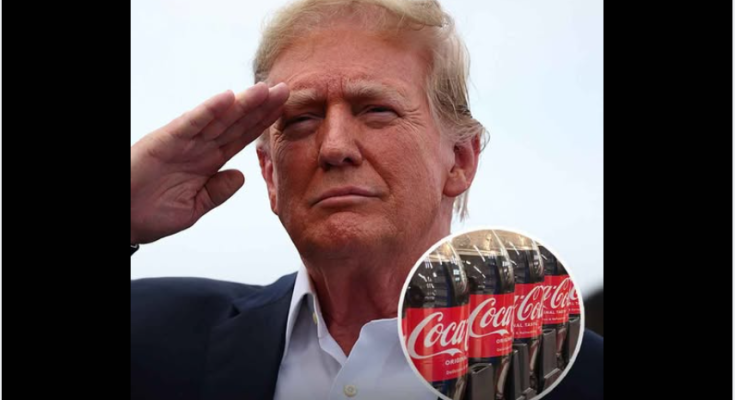Trump’s Proposal to Reformulate Coca-Cola: A Closer Look at the Cane Sugar Controversy
In a surprising move that sparked headlines and economic debate, former President Donald Trump announced on July 16, 2025, that Coca-Cola had agreed to a major change in its iconic soft drink recipe. Through a post on Truth Social, Trump claimed he had convinced Coca-Cola to replace high-fructose corn syrup (HFCS) with real cane sugar in its American products, describing the move as a step toward making the nation healthier. While the statement has energized certain health advocates and industry reformers, Coca-Cola has yet to confirm the claim officially, instead offering a measured response about “innovation” and appreciation for the former president’s interest.
Despite a lack of formal confirmation, the announcement reignited debates over food policy, health impacts of sugar alternatives, and the economic consequences for both consumers and producers. Here’s a detailed breakdown of what Trump proposed, what it could mean, and why it matters.
What Did Trump Actually Say?
On Truth Social, Trump wrote:
“I have been speaking to Coca-Cola about using REAL Cane Sugar in Coke in the United States, and they have agreed to do so. It’s just better!”
Trump, a known Diet Coke enthusiast, positioned the claim as part of a broader initiative he dubbed “Make America Healthy Again” (MAHA)—a nod to his “Make America Great Again” slogan. The initiative appears aligned with the efforts of health activists like Robert F. Kennedy Jr., who argue that HFCS contributes to chronic health issues, including obesity and diabetes, and advocate for its replacement in American food and beverage products.
Coca-Cola’s Response: Careful but Non-Committal
Coca-Cola’s official statement was noticeably more cautious. The company said it appreciated “President Trump’s enthusiasm for our products” and reiterated its commitment to offering a variety of beverages for consumers with diverse preferences. The statement included no direct confirmation of any recipe change.
Privately, company officials emphasized that Coca-Cola has long offered cane-sugar-sweetened versions of its drinks, such as the popular “Mexican Coke” and certain limited-edition holiday or kosher variants. These are typically imported or regionally manufactured and often sold at a premium price.
In other words, Coca-Cola seems open to consumer-driven innovation but has not pledged a full-scale national transition from HFCS to cane sugar.
What’s the Difference Between HFCS and Cane Sugar?
Both cane sugar and high-fructose corn syrup are forms of sugar, but they differ chemically and in public perception. Cane sugar, or sucrose, is a naturally occurring disaccharide made of equal parts glucose and fructose. HFCS is derived from corn and typically contains a slightly higher percentage of fructose (usually 55%) than glucose (45%).
Nutritionally, the two are nearly identical in calories and how they are metabolized by the body. Most health experts agree that excessive intake of either sweetener can contribute to health problems, but no substantial evidence shows cane sugar is significantly “healthier” than HFCS in typical consumption amounts.
That said, many consumers report a preference for the taste of cane sugar-sweetened soda, and it is often associated with “cleaner” or more natural ingredients. This preference has driven the popularity of “Mexican Coke,” which some Americans import specifically for its flavor and cane sugar content.
Health Debate: Real Improvement or Marketing Spin?
Some nutritionists have cautiously welcomed Trump’s proposal, citing the need for more transparency and natural ingredients in American diets. Groups aligned with the MAHA initiative argue that the U.S. food industry relies too heavily on processed corn products, which are subsidized and widely used in everything from snacks to condiments.
However, other health professionals and organizations warn that replacing HFCS with cane sugar won’t result in major health improvements unless consumers also reduce their overall sugar intake. According to Harvard’s T.H. Chan School of Public Health, both sweeteners contribute to similar spikes in blood sugar and insulin responses.
In that sense, Trump’s proposed reformulation may have more symbolic than practical health benefits.
Economic Impact: Winners and Losers
One of the most significant concerns surrounding this proposal involves its economic ripple effects, particularly for U.S. agriculture.
1. Impact on Corn Farmers
The Corn Refiners Association issued a sharp response, warning that a national shift away from HFCS could devastate American corn growers. They estimate a $5.1 billion drop in farm income and the loss of thousands of jobs in rural states that rely on corn production and corn processing industries.
Because HFCS is a major outlet for U.S. corn, a shift toward cane sugar would reduce demand and potentially lower prices—hurting a powerful political and agricultural constituency, especially in the Midwest.
2. Impact on Consumers
HFCS is widely used because it is cheaper to produce and integrate into mass manufacturing. Replacing it with cane sugar would increase ingredient costs. Analysts from MarketWatch and Sosland Publishing estimate this could drive Coca-Cola prices up by as much as 10%, depending on tariff exposure and supply logistics.
Even modest price increases across soft drink lines could cost consumers tens of millions of dollars annually, potentially hitting lower-income households the hardest.
3. Impact on Sugar Producers
Conversely, U.S. sugar producers—primarily located in Florida, Louisiana, and Texas—would likely benefit from increased demand. Foreign sugar exporters, especially in Central and South America, could also see economic gains if import restrictions are eased to support demand.
Political and Strategic Motivations
Critics argue that Trump’s proposal may be more politically strategic than health-driven. By positioning himself as a reformer of the food industry, he taps into populist sentiment, appeals to wellness-focused voters, and connects with rural cane sugar producers in the South.
It also allows Trump to differentiate himself on a domestic policy front—by challenging long-standing agricultural subsidies and regulatory decisions that favor corn-based products.
However, the move also risks alienating corn-producing states like Iowa, Nebraska, and Illinois—traditionally strongholds of conservative political support. If the switch were seriously pursued through policy or tariffs, it could create deep divides within Trump’s base.
Conclusion: A Bold Idea Without Clear Implementation
Donald Trump’s announcement of a major reformulation at Coca-Cola captured national attention but left many questions unanswered. Coca-Cola has not confirmed any such change and appears to be taking a wait-and-see approach, possibly gauging public response before committing to a costly and complex recipe overhaul.
While health advocates appreciate the conversation, experts caution that replacing HFCS with cane sugar—without addressing the nation’s overall sugar consumption—won’t solve America’s health problems. More pressing concerns lie in how much sugar we consume, not necessarily which kind.
From an economic standpoint, a national shift to cane sugar would disrupt supply chains, raise prices, and hurt corn producers—while boosting sugar industries in other regions. The feasibility of such a transition remains uncertain without government incentives or mandates.
In the end, the proposal offers more political theater than practical policy—at least for now. Still, it shines a spotlight on America’s complicated food system, and the challenges involved in even the smallest reformulations of our favorite brands.



